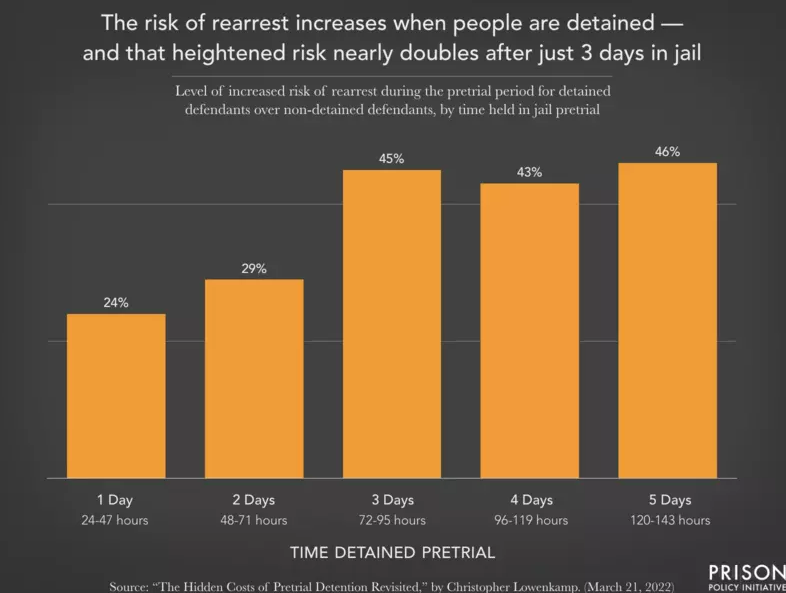The Harmful and Lasting Impact of Pre-Trial Detention
This is a subtitle for your new post

For court systems that continue to rely on monetary bail to determine whether people will remain in jail or at liberty while their cases are pending, the number of people in jail awaiting trial has grown precipitously, even with crime rates at historic lows. Approximately roughly 70 percent of all people in US jails have not been convicted of any crime. They are "presumed innocent" and simply waiting for their day in court.
People held in pretrial detention accounted for an increasing proportion of the total jail population over the same time period: 53% in 1970, 64% in 2015, to nearly 70% today. This growth is in large part due to the increased use of monetary bail. Historically, the purpose of bail was to facilitate the release of people from jail pending trial, with conditions set to ensure their appearance in court. Over time, however, those conditions have shifted away from no requirement that money be paid, or a requirement that money be paid only when people failed to appear in court, to upfront payment of cash bail and bail bonds issued by for-profit companies.
However, research suggests that pretrial detention leads to worse outcomes for people who are held in jail, both personally and legally, compared with similarly situated people who are able to secure pretrial release. People who lack economic resources and people of color may be particularly likely to be held in custody pretrial, irrespective of the merits of their cases or their likelihood of pretrial success.
Conversely, despite its rationale, pretrial detention does not deter crime. In general, there is no evidence to support detaining people in the name of public safety before they’ve been convicted of a crime. In fact, just a day or two in pretrial detention makes communities less safe. Researchers studying data from a Kentucky jail found that each day a person spent in pretrial detention was strongly associated with an escalating risk of a new arrest when that person was later released before the end of their trial. Compared to people who had been released, misdemeanor defendants who had been detained for at least a week were charged with 11% more new misdemeanors within a month of their bail hearings.
A recent study published by Prison Policy Initiative concludes that employment, health, housing, government benefits, and more are jeopardized by detention. Even a day or two in pretrial detention can destabilize a person’s life for years to come, contributing to its counterproductive influence on safety and justice. People who have been detained pretrial lose jobs more frequently than those who are released, while also struggling to get new jobs, encountering transportation issues, and contending with more “job issues” like fewer hours, demotions, and lost clients. People who are detained pretrial are more likely to lose government benefits than those who are released.
Other research shows that pretrial detention can be immediately life-threatening. Suicide becomes a serious risk very quickly: even our nation’s top officials acknowledge that “certain features of the jail environment enhance suicidal behavior.”
Reminder; people held in jail awaiting trial are still presumed innocent and have not been convicted of a crime, yet their lives are often irrevocably and harmfully impacted as if they were sentenced to incarceration for a crime. The whole concept of cash bail systems and pre-trial detention runs counter to the "innocent until proven guilty" ideal that the US Criminal justice system is said to be based on.
To read more on the detrimental impact of pretrial detention, read "Research roundup: Evidence that a single day in jail causes immediate and long-lasting harms" at Prison Policy Initiative, a non-profit organization who seek to produces cutting edge research to expose the broader harm of mass criminalization, and then sparks advocacy campaigns to create a more just society.










